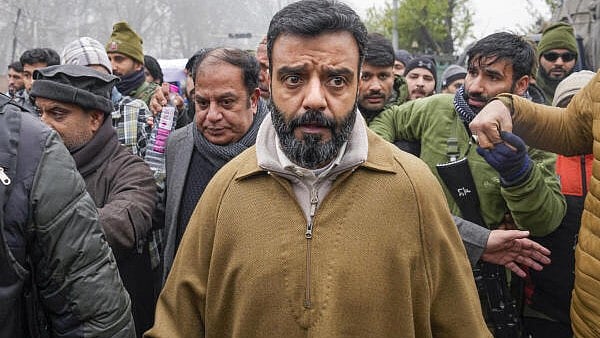
National Conference MP Aga Syed Ruhullah Mehdi
Credit: PTI Photo
Srinagar: Ruling National Conference (NC) leader and Srinagar MP Aga Syed Ruhullah Mehdi’s recent remarks hinting at the formation of a new political front based on “credibility, accountability, and structural reform” have sparked cautious curiosity in Kashmir’s volatile political landscape.
But history tempers that curiosity with realism: such experiments, though bold, rarely endure here.
Known for his uncompromising opposition to the abrogation of Article 370, Ruhullah has not officially parted ways with the NC, but his recent rhetoric suggests a separation may not be far off. Speaking at a gathering in north Kashmir’s Sopore, the firebrand Shia leader pulled no punches.
“I’m in Parliament by force, from the party side. I don’t need positions, I don’t need chairs. No, not at all,” Ruhullah said. “What Jammu and Kashmir truly needs is not political cosmetics but a comprehensive structural change, one where God, truth, and accountability take precedence over party structures and personal gain.”
He accused the political class of blind loyalty to parties “even at the cost of ethics and truth.” “People here fear violating party lines more than they fear God,” he said, calling out the culture of privilege and silence that, according to him, has crippled Kashmiri politics.
If Ruhullah resigns from the NC and Parliament, he will walk a path once taken by former PDP MP Tariq Karra, who quit in protest during the 2016 uprising. While Karra was briefly hailed for taking a moral stand, his political relevance faded soon after. Many fear Ruhullah could meet a similar fate.
“In Kashmir, one day you are a hero, the next you are irrelevant,” said Prof Gul Wani, former head of the Political Science Department at the University of Kashmir. “Politics here isn’t driven by principle alone—it requires networks, narrative control, and the ability to survive the churn.”
Ruhullah’s remarks haven’t been well received by the NC leadership. Omar Abdullah, party vice-president and former chief minister, openly rebuked him. “Where are you going to get these new faces from? These people (MLAs) have been elected for five years. Why are you wasting your time?” Omar asked, in a clear message to the estranged MP.
Kashmir is no stranger to political experiments. Shah Faesal, the Valley’s first IAS topper, formed the Jammu and Kashmir People’s Movement in 2019 with dreams of clean politics.
A year later, he exited politics. Post-Article 370, the emergence of parties like Altaf Bukhari’s Apni Party and Ghulam Nabi Azad’s DPAP also failed to strike a chord. Many Kashmiris saw them as proxies of BJP and bereft of grassroots connect.
Whether Ruhullah can offer a credible alternative remains to be seen. His consistent stand has earned him admiration, especially among educated youth. Yet, his Shia identity could be a limiting factor in the Sunni-majority Valley. “Let’s be honest—sectarian identity matters in Kashmiri politics,” admitted a senior NC leader, requesting anonymity.
Still, some believe Ruhullah’s brand of soft separatism—resistance through moral clarity rather than militancy—could find resonance. “He is not calling for violence. He’s talking about dignity, truth, and reform. That’s powerful in today’s Kashmir,” said a Srinagar-based analyst.
For now, Ruhullah remains non-committal on quitting NC. But if he does break away, he will enter a political arena littered with the wreckage of similar efforts. Whether he can rewrite that script will depend not just on his convictions, but also on his ability to build mass support—and withstand Kashmir’s unforgiving political winds.